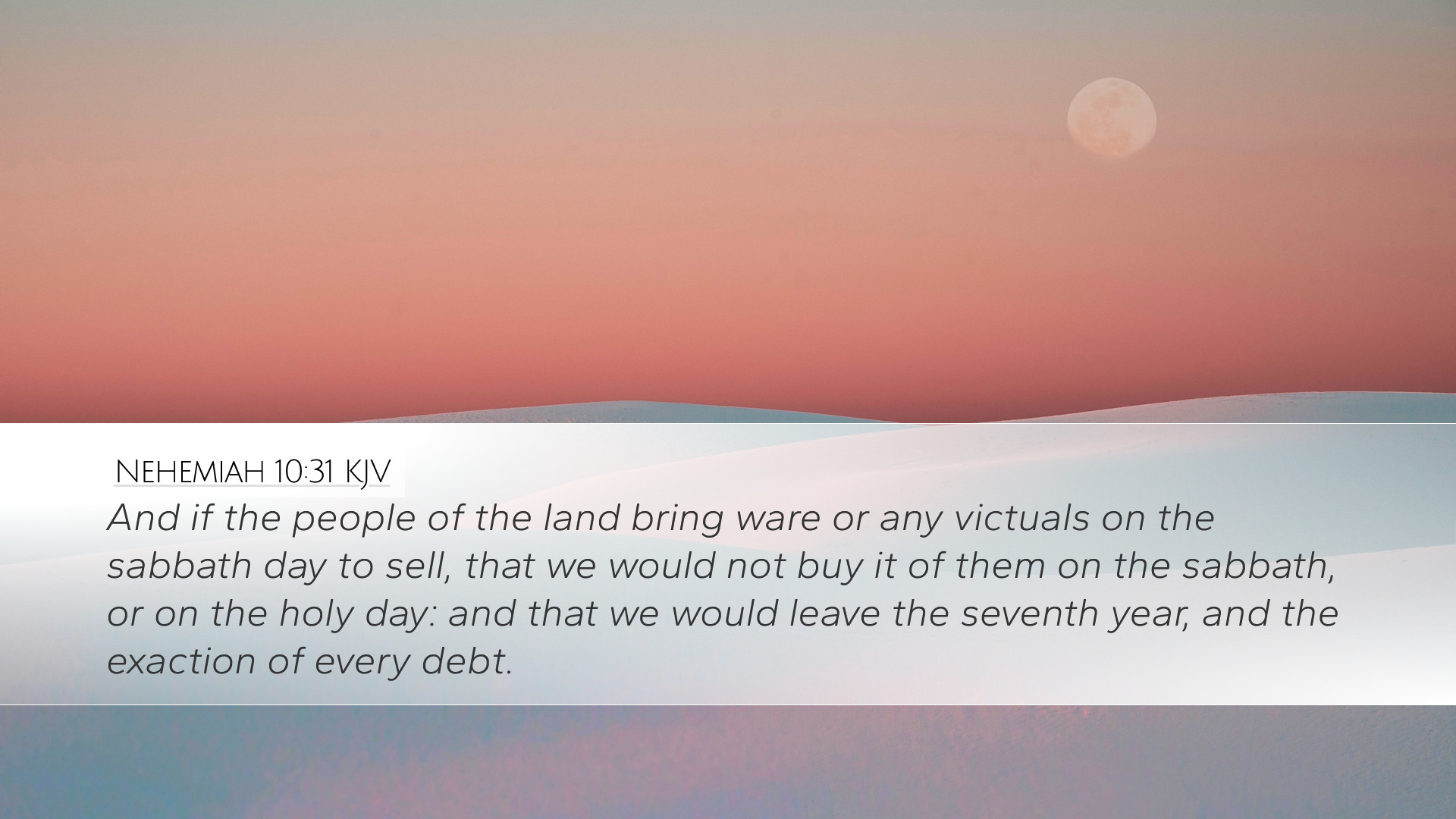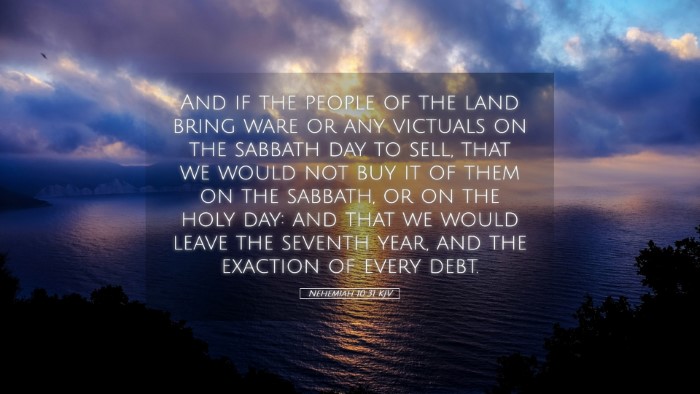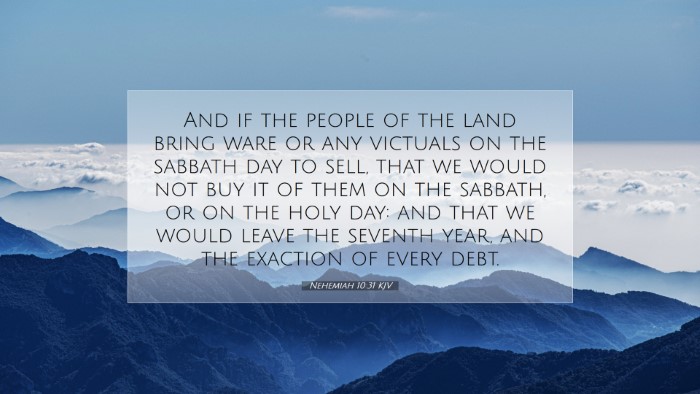Commentary on Nehemiah 10:31
Verse (Nehemiah 10:31): "And if the people of the land bring ware or any victuals on the sabbath day to sell, that we would not buy it of them on the sabbath, or on the holy day: and that we would leave the seventh year, and the exaction of every debt."
Introduction
The decree recorded in Nehemiah 10:31 is a pivotal moment for the returning exiles and demonstrates their commitment to uphold the Law and sanctify the Sabbath. As scholars and theological students approach this text, understanding its implications for ancient Israel and its relevance for contemporary faith practices is essential. This commentary synthesizes insights from respected public domain commentaries to explore the theological and moral ramifications of this verse.
Historical Context
Nehemiah’s reforms occurred after the Babylonian exile, where the Jewish people had been fragmented and subjected to foreign influences. Their return aimed not just to rebuild Jerusalem’s walls but also to restore God-given identity and observance of law.
The Importance of the Sabbath
The Sabbath was integral to Israel’s covenant identity (Exodus 31:16-17). It served as a day of rest, reflection, and worship, distinctly setting Israel apart from surrounding nations. The call to refrain from commerce on this holy day emphasizes a commitment to spiritual fidelity over economic gain.
Thematic Exploration
1. The Temptation of Commerce
Nehemiah 10:31 warns against the perils of commercial activity on the Sabbath. Matthew Henry observes that the propensity to engage with merchants could dilute the sanctity of the holy day. The challenge lies in the natural inclination of humanity toward material pursuits, which can overshadow spiritual responsibilities.
Implications for Today's Christians
This verse continues to speak to the church regarding the importance of setting boundaries to protect the Sabbath from secular influences. Albert Barnes notes that the commitment to refrain from purchasing indicates a broader stance against allowing a culture of transactional relationships to infiltrate worship.
2. The Significance of Community Standards
Nehemiah's call implies a community regulation of behavior. The principle at stake is not merely individual piety, but collective observance. Adam Clarke elaborates on the necessity for the entire community to adhere to these regulations, representing a unified front against external pressures. The call to 'leave the seventh year' reflects a deeper understanding of social justice and restoration.
Justice in Economic Practices
Leaving the seventh year signifies the observance of debt cancelation and the release of the poor from their burdens. Just as the Jewish people revisited God’s covenantal expectations, modern congregations are challenged to re-evaluate their economic relationships and ensure fairness and equity within their communities.
3. Holiness and Separation
The verse expresses a commitment to holiness and separation from foreign influences. By steering clear of participating in the transactions of those outside their faith community, the Israelites aimed to preserve their identity and practices. Matthew Henry articulates the need for believers to remain sanctified and distinct from secular practices which can lead to moral compromise.
Sabbath Keeping in Contemporary Society
Thus, adherents today are called to hold the Sabbath as a sacred time, resisting societal pressures to conform to consumerist ideologies that promote incessant activity. This principle encourages believers to cultivate a rhythm of work and rest, contributing to a holistic view of life that honors God in every aspect.
Theological Significance
The implications of Nehemiah 10:31 extend beyond the historical context of Israel; they resonate deeply within Christian theology. The observance of the Sabbath is mirrored in the New Testament, where Jesus emphasizes the spirit of the law over the letter (Mark 2:27). This approach does not negate the call for holiness but rather expands it within a grace-filled paradigm.
Rest as a Theological Concept
The concept of rest found in Sabbath observance echoes throughout Scripture, culminating in Christ who offers ultimate rest (Matthew 11:28-30). As Henry contemplates, the invitation to cease from striving opens up opportunities for deeper communion with God. Thus, today's pastors and theologians should emphasize a theology of rest that nurtures spiritual health and community well-being.
Practical Applications
- Establishing Sabbath Practices: Leaders are encouraged to foster community awareness of the Sabbath, creating practices that buffer against commercial distractions.
- Engaging with the Poor: Inspired by the call to leave the seventh year, congregations should actively pursue justice and care for their less fortunate members.
- Educating on Holiness: Teaching on the nature of holiness should be emphasized, inviting congregants to view their entire lives through the lens of sacredness.
Conclusion
In conclusion, Nehemiah 10:31 is a profound reminder of the commitment to holiness and community standards in the life of faith. By abstaining from commerce on the Sabbath and observing practices that honor God, believers set a precedent that prioritizes spiritual fidelity over material gain. The historical lesson and theological insights contained within this verse challenge modern Christians to remain devoted, to seek justice, and to cultivate a rhythm of life that reflects God’s character to a watching world.


